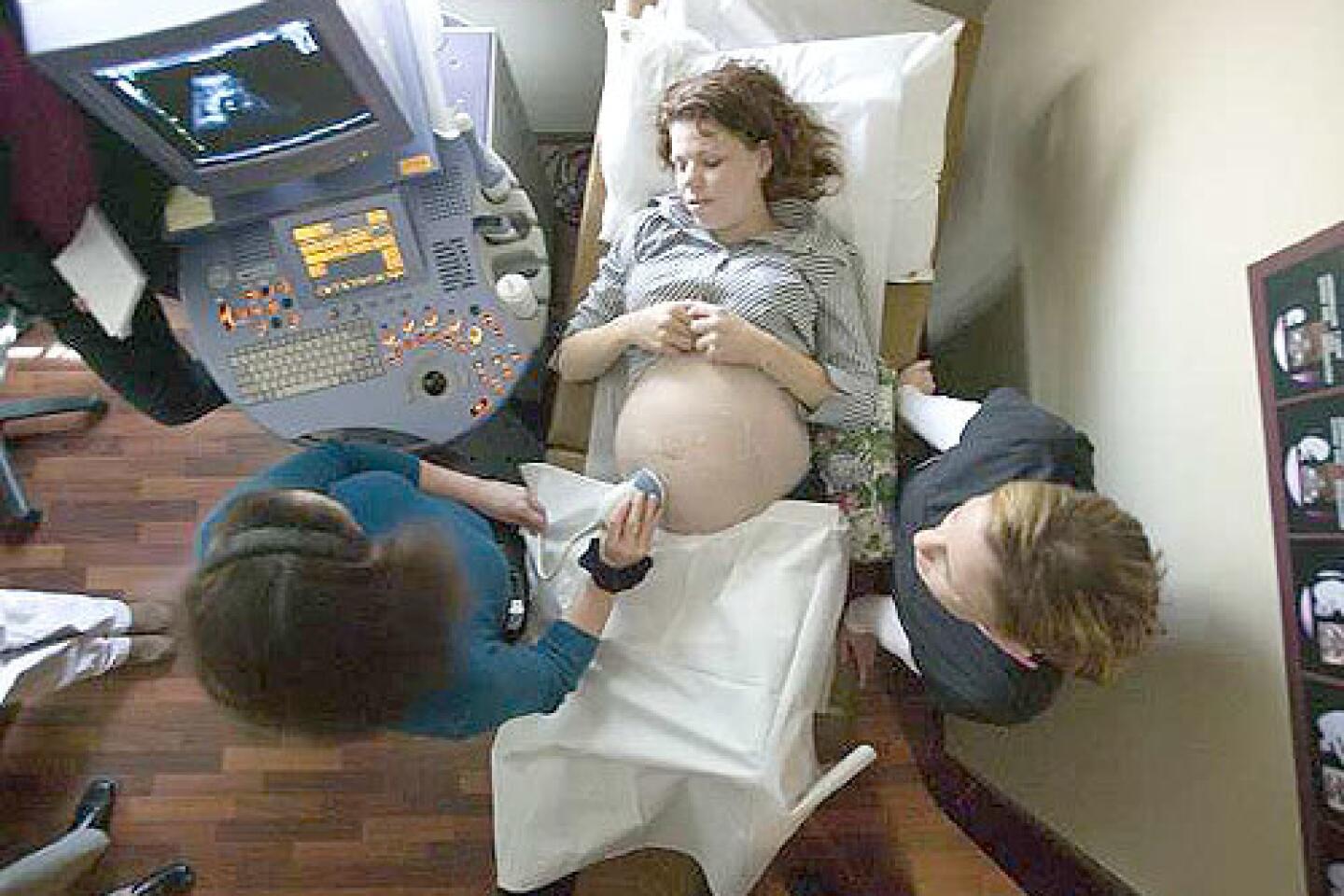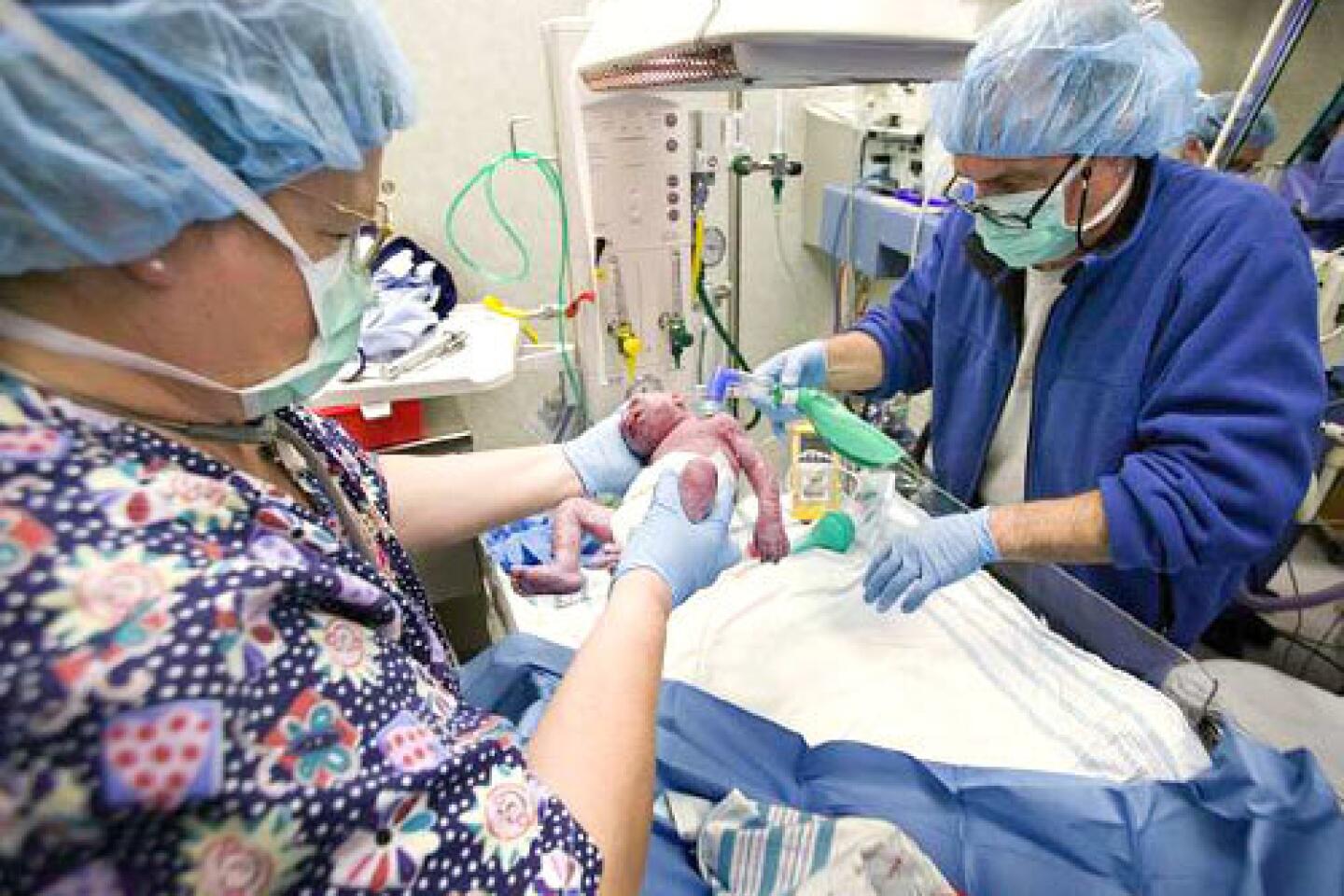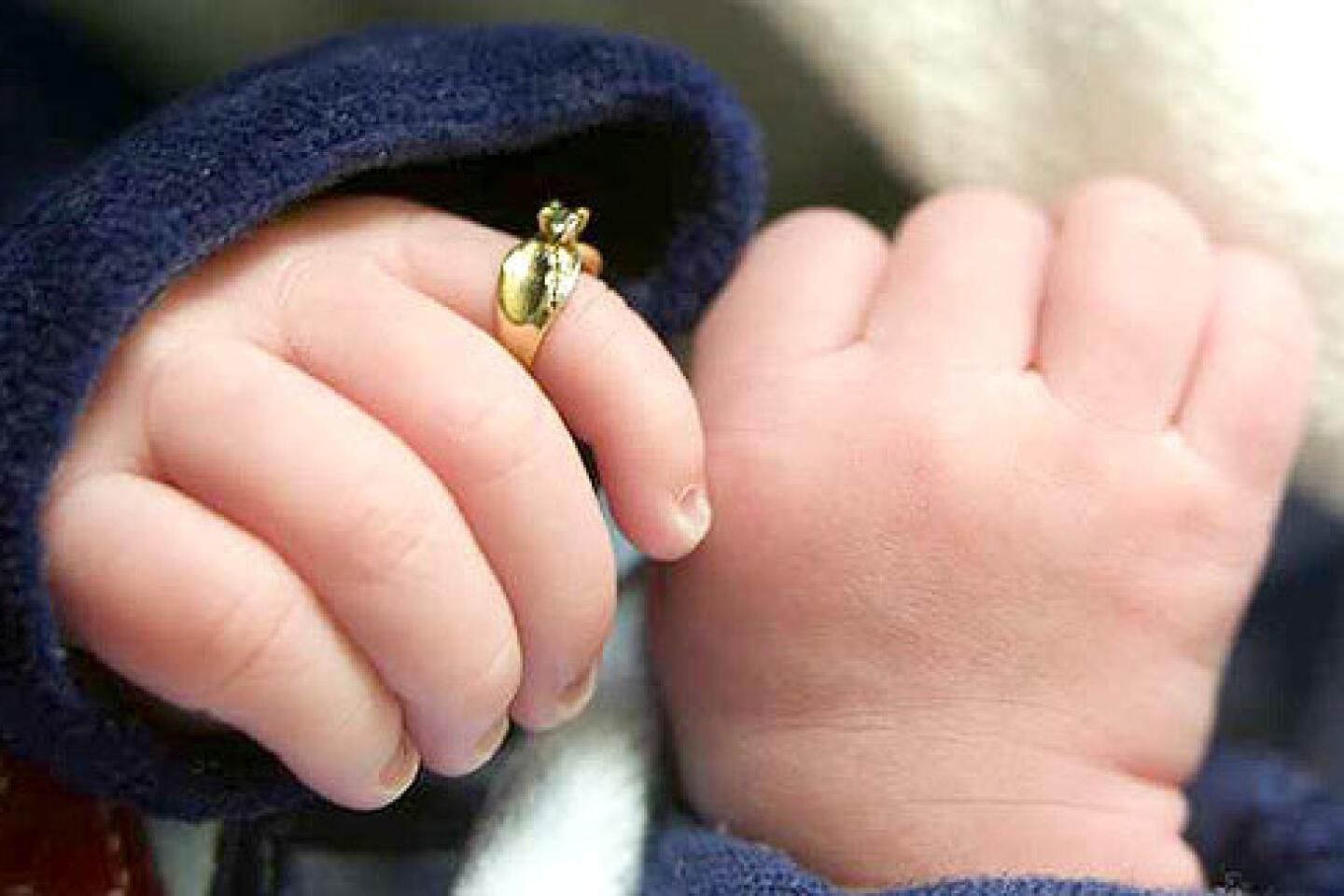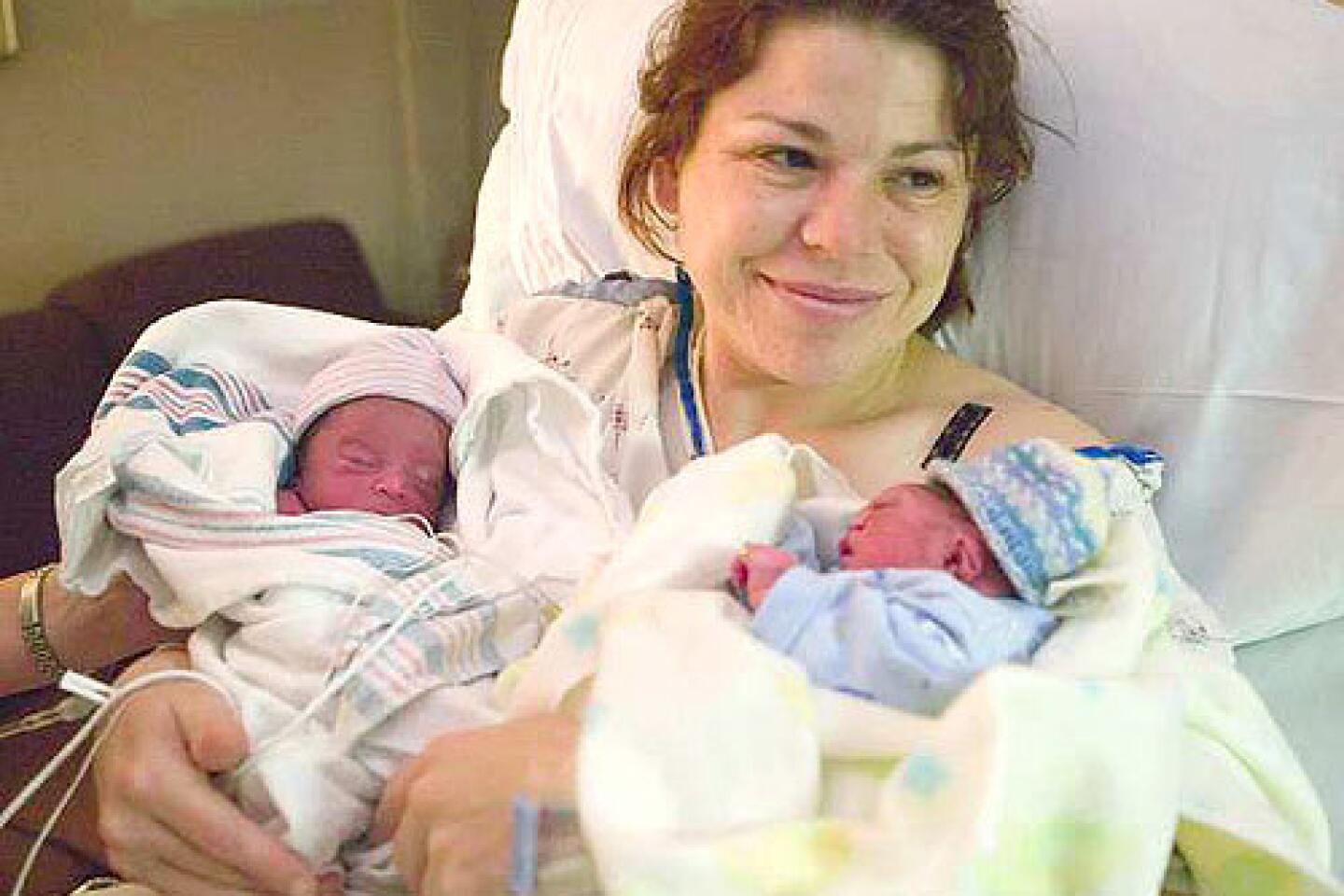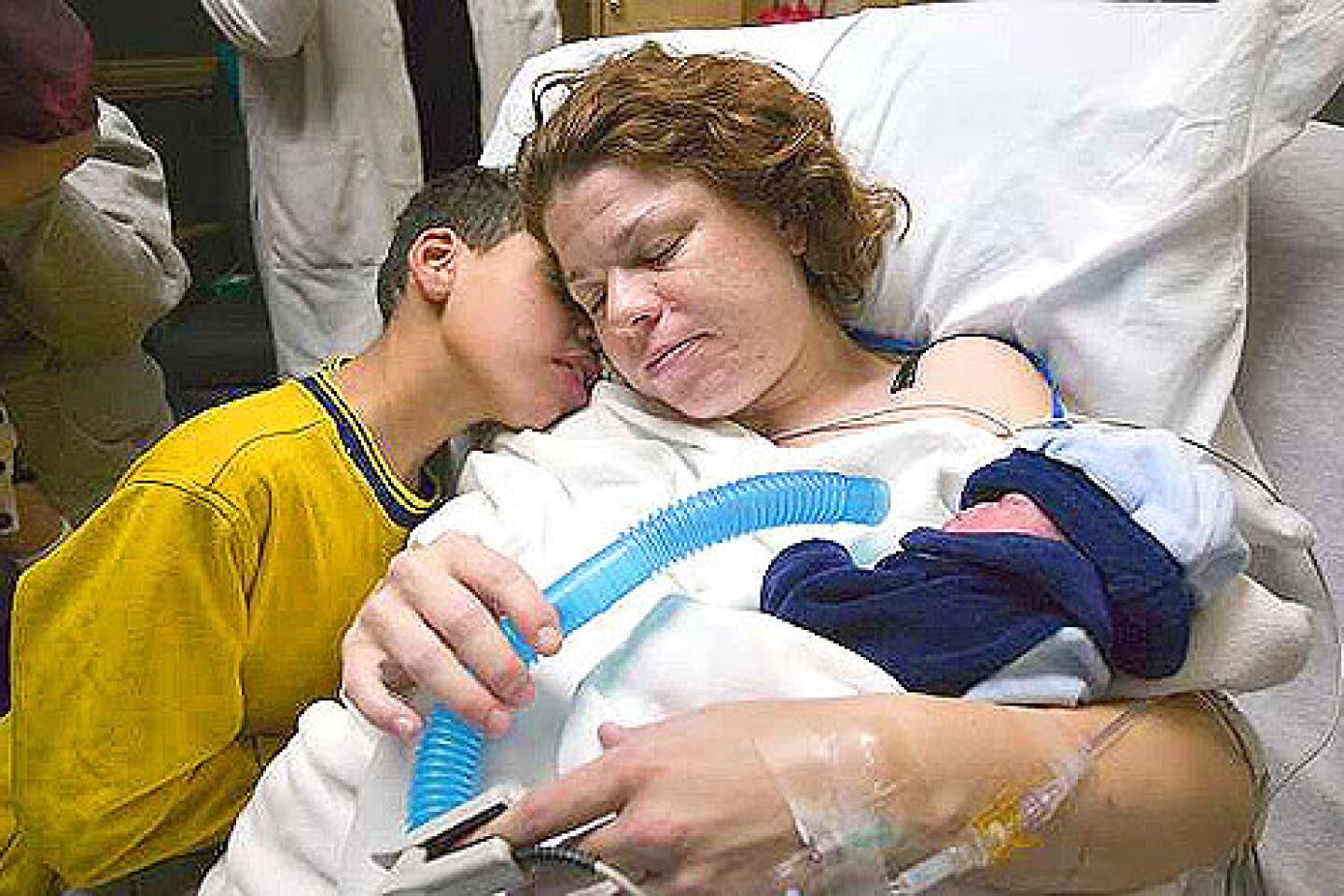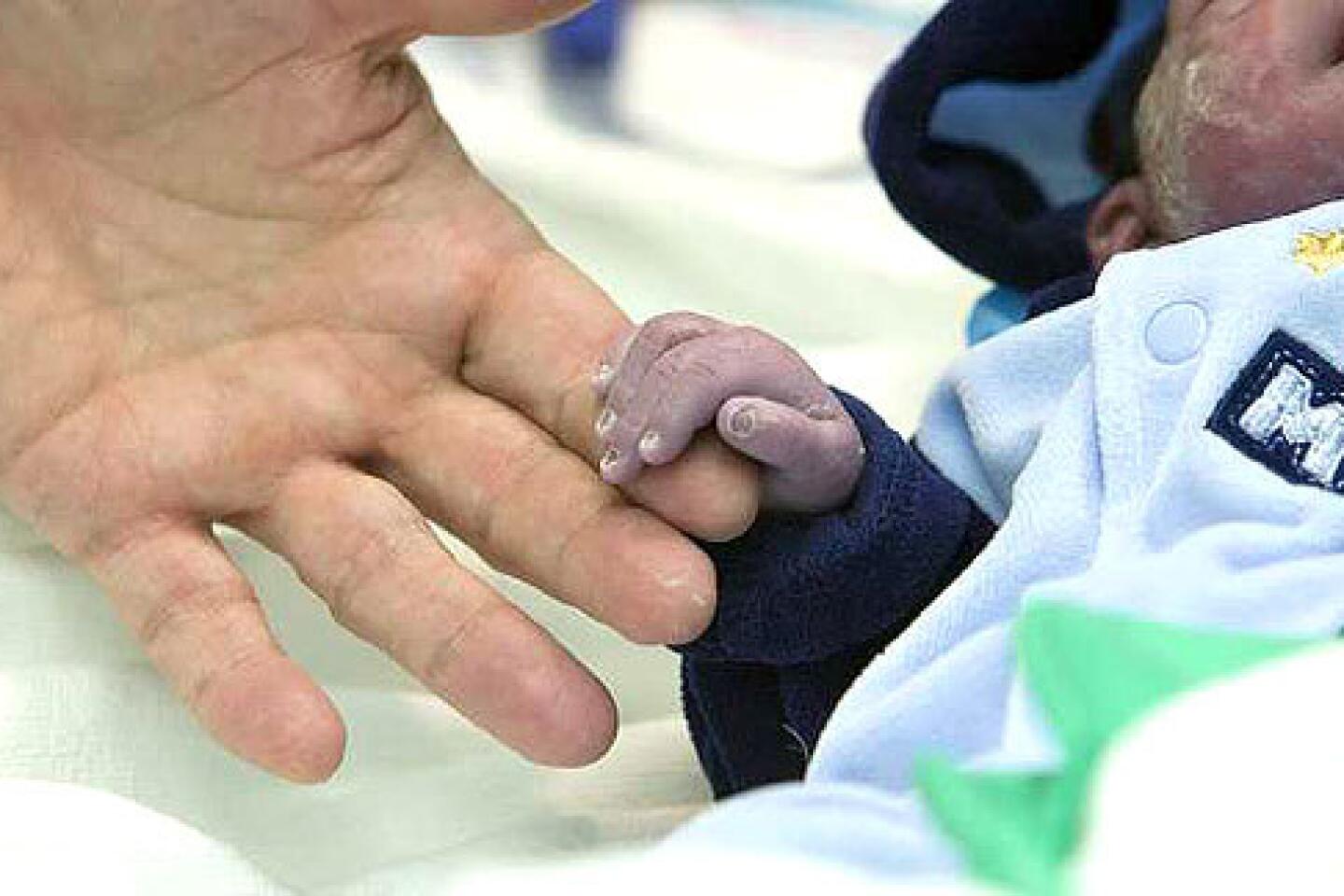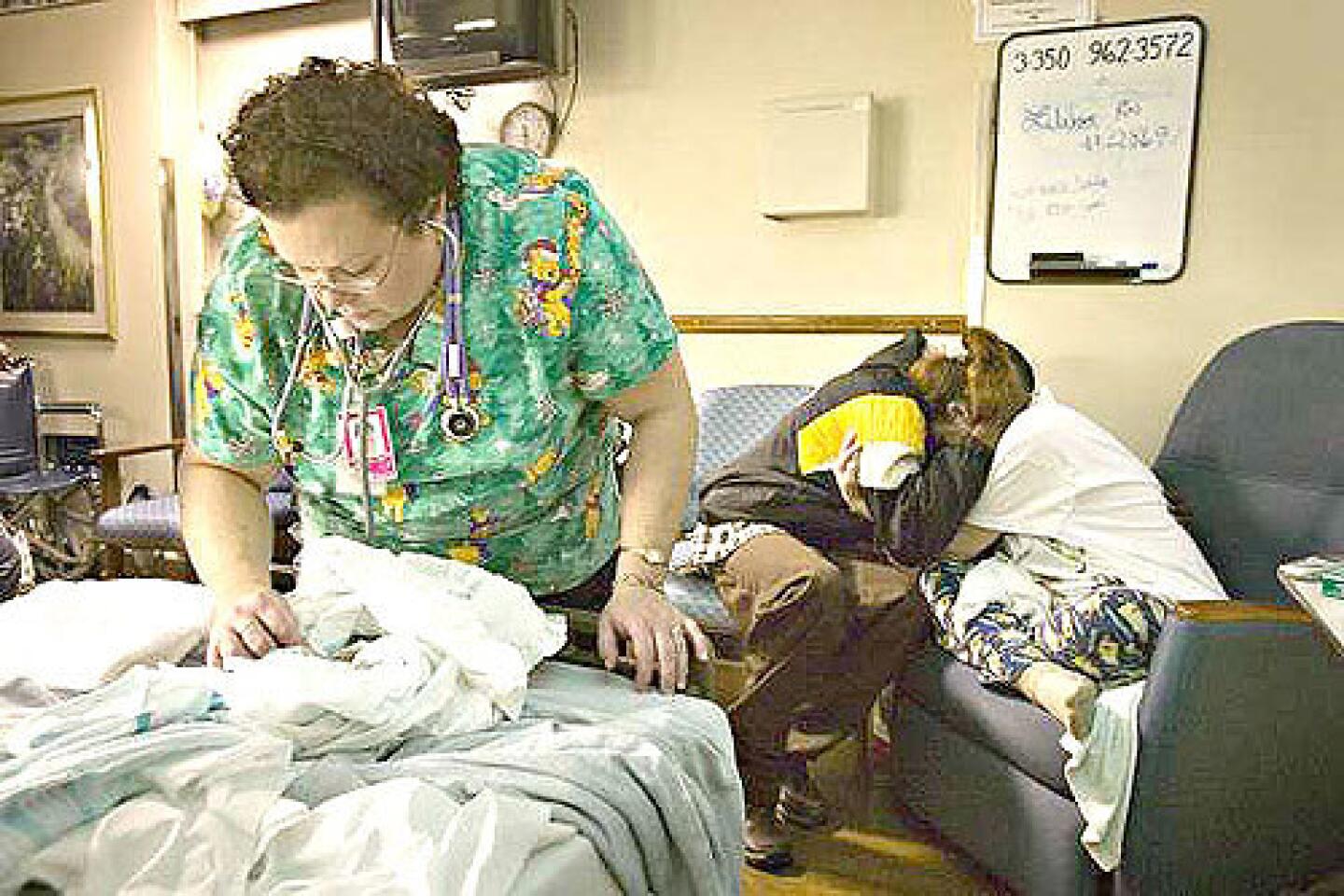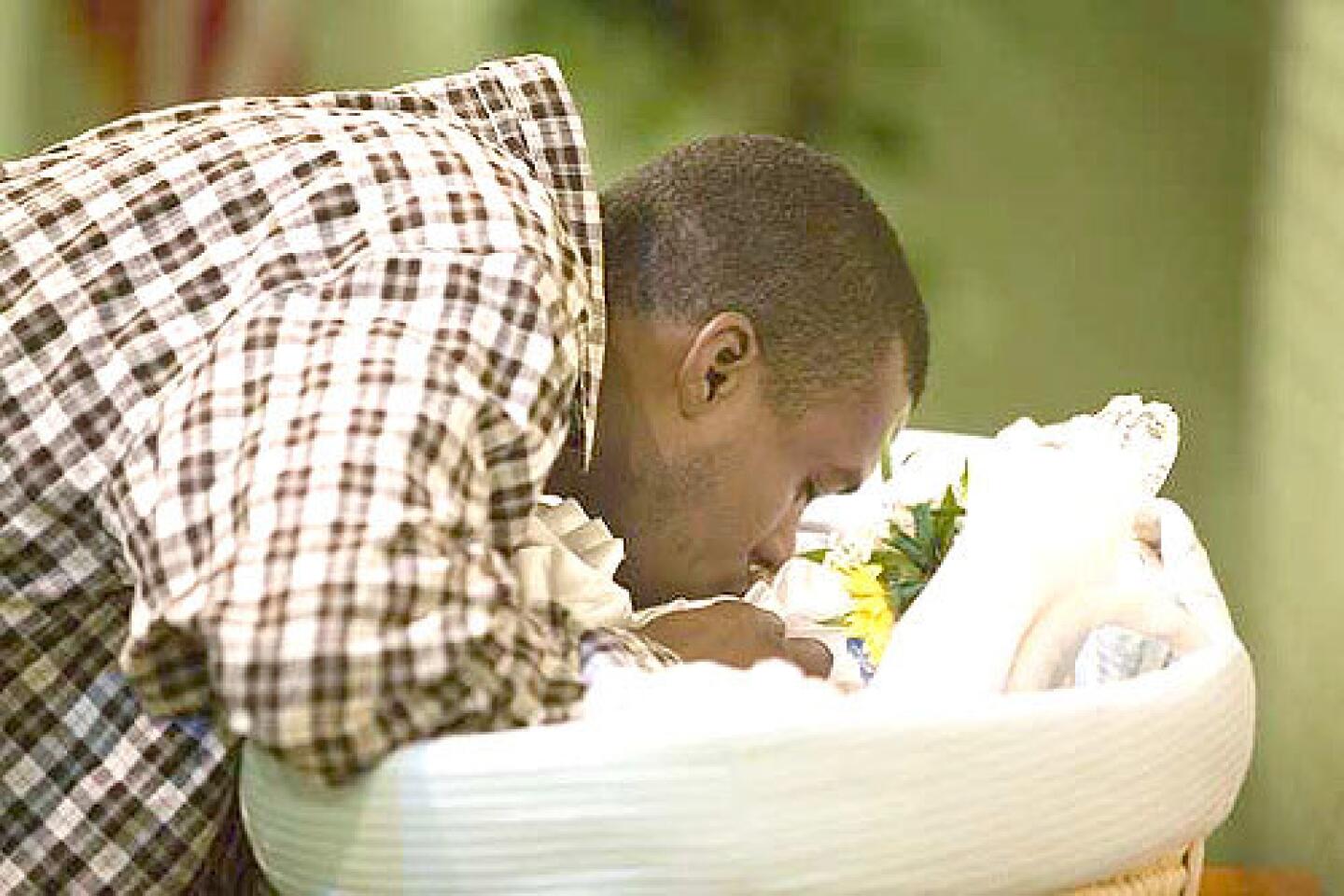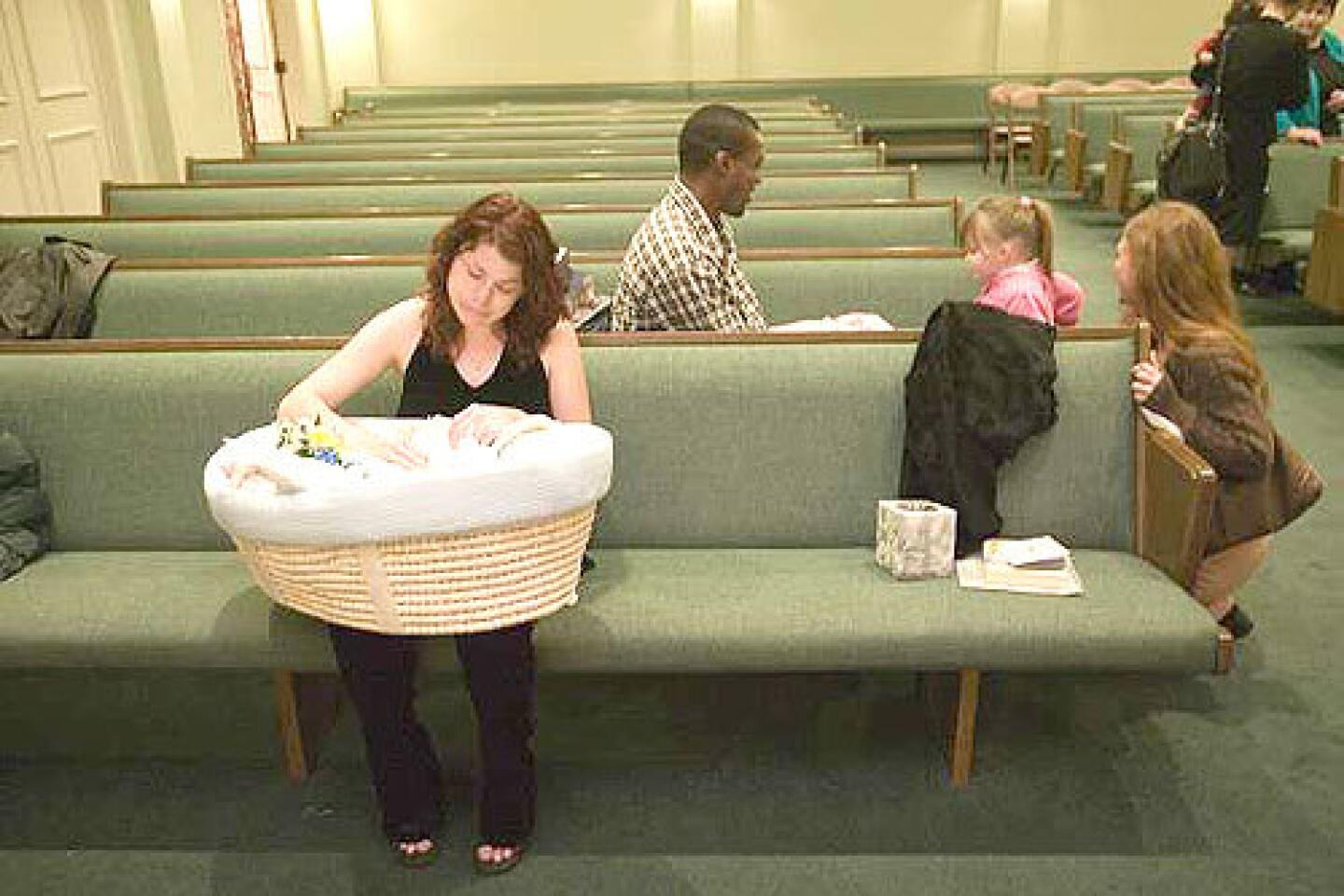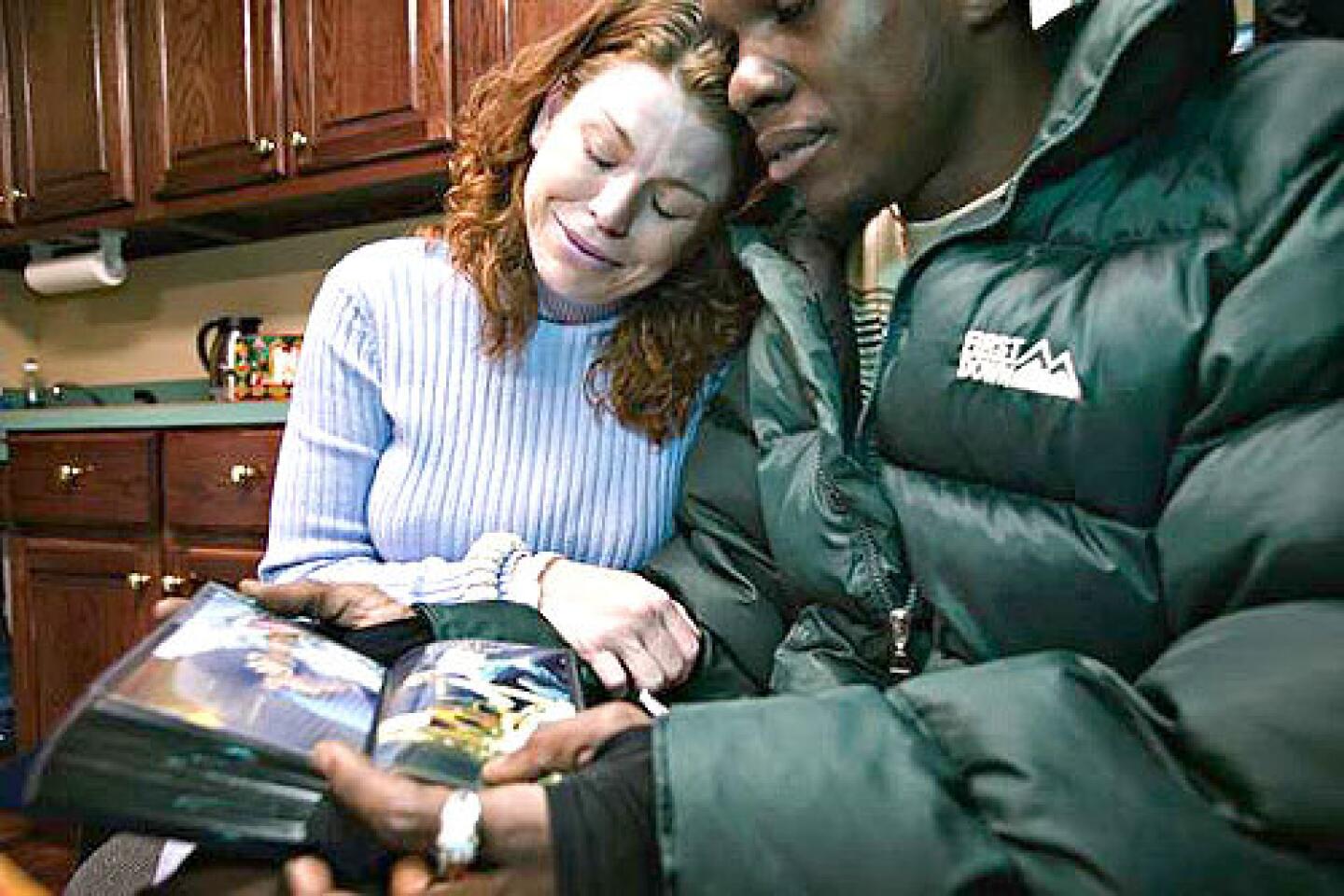Grief, Gratitude and Baby Lee
She wanted to honor her son, to celebrate his life, however short. That’s why she had refused an abortion, even after doctors told her that her little boy would be born without a brain.
Now he was here, squirming in his blankets, and Danielle Hayworth could not bring herself to hold him.
Her hospital room was packed with relatives cooing at her son’s sweet face, telling her to enjoy every minute she had with him.
Danielle turned away from the bassinet. This was all she had dared pray for: a few moments to hug her son close, to memorize his sounds, his smell, how his thin fingers felt clasped around her own. But all she could think about was losing him, and how her heart would break.
She could not bear the waiting. She wept, and wished for it to end.
“Is that bad of me?”
Danielle found out she was pregnant in May when she dragged herself to the emergency room, weak from days of vomiting. The news left her stunned and scared.
Her two marriages had ended in divorce, and Danielle, 30, was raising her two boys alone. Her boyfriend, Lee Crump, was excited about becoming a father for the first time, and he was able to offer some financial support; he had a decent job pouring cement. But Danielle didn’t trust any man to stick around once the responsibilities of parenting caught up to him.
She wasn’t sure she was ready for more responsibility herself. A high-school dropout, she had earned an equivalency degree, but worked mostly in temporary clerical jobs. She got health insurance from the state; federal housing vouchers; disability checks for her 9-year-old, Jonathan Price, who has cerebral palsy. Still, there was never enough money.
Her bungalow, across the street from a lumberyard, was sparsely furnished: a ripped couch, a TV, a shelf of children’s books. The scuffed walls of the living room were bare except for a few framed portraits of her boys. Danielle didn’t have a bed for her 3-year-old, Dashon Starr; he had to share with her. A baby would need a crib, a car seat.... She lay awake nights.
In early June, a sonogram picked up two heartbeats: twins. Danielle felt sick.
Two weeks later, another scan detected five cysts, possible signs of a birth defect, in Baby A’s gestational sac. Danielle thought of abortion, but only briefly; she knew she couldn’t, because of Jonathan.
Her son had suffered an unexplained cerebral hemorrhage in the womb at the start of her third trimester. Warning of severe brain damage, Danielle’s doctors recommended abortion. But Danielle had recently started going to church; firm in her newfound faith, she decided to leave the baby in God’s hands.
Jonathan suffers frequent seizures and can’t always control his hands. He’s prone to outbursts so violent that Danielle once called police to subdue him.
But he also can be gentle, and protective of his momma. He told her that he wanted to get a job at Taco Bell so he could buy her a car that wouldn’t break down. When she sits on the couch, he kneels next to her and rests his head in her lap. He cuddles with her, rapt as she reads him “Thomas the Tank Engine.”
He makes her smile, too. Like the day he climbed off the school bus and, with a swagger, announced: “I need some breath spray so I can smell good for the ladies.”
His brother Dashon is a happy-go-lucky kid who tears through the house wearing nothing but saggy shorts and an enormous grin. Danielle calls him her little stinky and smiles every time she talks about him: “He makes me feel like I’ve done something right.”
When she was 16, Danielle aborted a pregnancy at her father’s insistence, she said. She has made peace with that now. But when she thought of Jonathan, when she felt the bump of her stomach, she knew she could not abort the twins. Nor would she consider adoption.
“I couldn’t give up my babies. I couldn’t,” she said. “They’re my kids. I’m going to take care of them.”
She and Lee, 32, picked out their names: Baby A, the boy, would be Lee Jr. Baby B, the girl, would be Leah.
It was five weeks before another ultrasound, in late July, clarified the problem with Lee. In the first weeks of embryonic development, the neural tube that forms the brain and spinal column had failed to seal, a defect sometimes associated with a lack of folic acid in the mother’s diet.
Lee’s brain stem, which regulates breathing and heartbeat, was probably intact. But his skull had not formed, nor the back of his head, and any bits of upper brain tissue that had developed now steeped, unprotected, in amniotic fluid. He would not see or hear or think.
Anencephaly occurs in 1 in 10,000 live births in the U.S. A very few afflicted infants have survived as long as four months. Nearly all die within days, many within hours, from dehydration, infection or trouble swallowing.
The specialists she consulted offered Danielle a “selective reduction”: They could abort the malformed twin. That might give her a better chance of carrying the healthy baby to term, but there was also a chance that the procedure could harm Leah. Danielle was not interested in weighing risks.
“I couldn’t make God’s decision,” she said. “Everything happens for a reason.”
The sign offering free ultrasounds hangs off a modest white building in central Wichita, around the corner from a car dealership and a budget motel. By letting women glimpse the life growing inside them, Choices Medical Clinic aims to dissuade them from abortion.
Danielle came to Choices for a pregnancy test days after the emergency room doctors told her she was expecting. She was looking for confirmation and reassurance, someone to talk with as she came to terms with the news.
Then Lee was diagnosed with anencephaly, and Choices became a lifeline for Danielle. The nonprofit clinic runs one of the nation’s few perinatal hospices: a free support program for women carrying babies they know will not survive.
Such women often feel abandoned as their pregnancies progress; friends and family don’t know what to say, so they tend to retreat. Choices’ medical director, Dr. Scott Stringfield, steps into that void. “We pour on the love,” he said.
An intense man who favors black T-shirts and keeps his gray hair cropped military-short, Stringfield, 48, bluntly explains to his patients what their child will look like when he is born, and how he will die. He insists they think through the choices they will face: when to insert a feeding tube, when to resuscitate, when to do nothing more than hug a dying baby tight.
But Stringfield also helps expectant parents to anticipate the birth with joy. He offers them ultrasounds as often as they want so they can marvel at all that’s right with their child instead of dwelling on what’s wrong. He shows them it’s OK to laugh as well as to grieve.
Hospice patients continue to see their obstetricians for medical care, freeing Stringfield and other Choices volunteers to focus on their emotional needs. Between appointments, many patients turn for support to Tammy Schafer, the clinic’s nurse.
With a nurturing spirit and bubbly laugh, Tammy, 34, treats her hospice patients as family. She brings them chicken soup when they’re sick. She takes them shopping for baby clothes and for urns. When they go into labor, no matter the time, she meets them at the hospital, camera in hand, prepared to share every bittersweet moment.
“It helps them to know that they did everything they could to enjoy that baby,” she said.
Several medical students Stringfield has mentored at the local Catholic hospital plan to open their own perinatal hospices. Outside the antiabortion community, the concept is also gaining support, driven by improvements in prenatal diagnostics, which allow more women to learn of birth defects earlier in pregnancy.
Hospices serving the terminally ill in San Diego, Fresno and Kansas City, Mo., run well-regarded perinatal programs. Several hospitals around the country, including St. Joseph Hospital in Orange County, offer a similar service. Trinity Kids Care, which serves Los Angeles, is also moving into the field.
Choices, which opened in 1999, has guided three dozen families through its hospice.
Danielle looked wary when she came in for her first consultation one morning in late September. Her face was drawn and pale but for her freckles; her curly reddish-brown hair was pulled back in a ponytail. Though she was halfway through her second trimester, she barely showed under her T-shirt and jeans; she had gained less than 7 pounds. Almost as soon as she sat down, she was in tears.
“What hospice really means is that we’re going to share this with you. We’re going to bear it with you,” Stringfield told her.
“Who’s your support system?” he asked.
Danielle tried to think. She and her boyfriend, Lee, had broken up and he had moved out. Her friends avoided talking about the twins. Danielle spoke with her mom sometimes, but she was ashamed to ask for much help; she had made her own bad choices in life and she wanted to set things right herself.
“I have nobody,” she finally said.
Stringfield reached over to rub her arm. “You have us.”
They talked for more than an hour. Stringfield asked Danielle about her fears, finances, even her heartburn, and listened attentively, jotting notes. Finally, he led her into the clinic’s darkened sonogram room. Danielle was so worn out, she barely looked as Tammy squirted ultrasound gel on her stomach in the shape of a smile.
Then the twins appeared on the screen in blurry black and white.
“There’s Lee!” Tammy called. “There’s his leg and his knee and his little fist.”
Danielle’s jaw unclenched. Staring at her son’s curled fingers, she beamed, eyes glistening.
“Want to hear his heartbeat?” A rhythmic whoosh filled the room.
“My baby,” Danielle said, her voice swollen. “No matter what, that’s my baby.”
Tammy switched off the heartbeat and Danielle looked back at the screen. “I don’t ever want to forget him,” she said. “Memories fade. I don’t want to forget.”
The dream came on an early October morning, after another restless night.
Danielle saw herself holding baby Lee. She wanted to show him off to her friends, but all she could say, over and over, was that he would soon die. Then she was trying to get him to nurse. She was frantic to keep him awake.
The dream shifted; she was at home. Lee rolled off the couch before she could stop him, bloodying his mouth and his nose.
Danielle woke up shaken.
“This is the first day for a long time I’ve thought: ‘Can I do it? Do I want to do it?’ ” she said. “Then I feel guilty for even thinking that. I don’t believe in abortion. I don’t. But it’s like I can’t stop thinking: ‘Can I do this?’
“I don’t know if I can see my baby die.”
Each time she visited the hospice, Danielle was reminded that she had a choice. The windowless beige building next door is Women’s Health Care Services, one of the best-known abortion clinics in the nation.
Dr. George R. Tiller specializes in terminating late-term pregnancies after the fetus has been diagnosed with a birth defect: a deformed heart, missing kidneys, Down’s syndrome, anencephaly.
He calls his work a “reproductive ministry,” and he offers his patients many of the same services as the hospice. Tiller encourages parents to hold, dress and photograph their aborted children, whom he delivers stillborn but intact. His staff takes ink-prints of tiny feet and hands; he brings in a chaplain for baptisms. Letters from grateful patients line the clinic’s walls.
Antiabortion activists gather outside Tiller’s clinic nearly every day, amid dozens of white crosses they have placed along the sidewalk. They yell at the women who turn into the parking lot: “Mommy, save me! I don’t want to die!”
Those shouts disturbed Danielle every time she drove to Choices. She felt she was doing right by her baby and by God. But she understood why other women went next door.
As she neared the start of her third trimester, in mid-October, decisions pressed in on Danielle.
Stringfield had told her Lee would have a much better chance of living a few hours if born by caesarean section. Vaginal births put a lot of stress on a baby’s head; without skulls to protect them, anencephalic infants often do not survive the trauma.
The thought of hurting her son made Danielle cry, but so did the thought of a C-section. The surgery would keep her in the hospital an extra day. Who would watch Dashon and Jonathan? She’d come home sore. What if Jonathan had a seizure? How would she pick him up? “I feel so torn,” she said.
Then there was the funeral. She was anxious about how Lee would look in an open casket, but mad at herself for worrying about it; she didn’t want to be ashamed of her baby.
A prayer ran constantly through her head: Give me strength.
One morning, overwhelmed with despair, her body aching, Danielle called Tammy. Two hours later she was lying in the clinic’s ultrasound room, marveling at Leah’s chubby cheeks. Danielle had to smile when she saw Leah’s nose -- it looked just like Lee Sr.’s. “Poor thing,” she said.
Tammy had noticed in an earlier scan that Lee had a severe cleft lip. From then on, she talked up his cutest features: his long fingers and pert chin, a fringe of hair above his ears.
“I’ve been bawling all weekend, but after I saw that sonogram, I just don’t feel like crying,” Danielle said a few hours later. “Sometimes I wish I wasn’t pregnant. But then I look at the pictures of the babies and I feel thankful.”
The next day, she decided she would ask for a C-section.
“I want that chance with Lee,” she said. “I want every single second that God gives me.”
It helped that she felt less alone. She was still separated from Lee; he told her he didn’t know how to cope with the pending birth and death. But his cousin Latrina “Teeny” Jones, 35, stepped in to help. She came over to cook, to vacuum or just to talk.
Danielle talked regularly with Christine Beck, a former hospice patient who had given birth in 2001 to a son with anencephaly. She called or text-messaged Tammy five, six, sometimes a dozen times a day.
“Then I don’t feel so crazy,” Danielle said.
She and Tammy talked about getting a tiny hat to fit Lee’s head, about finding a heart-shaped jewel box to hold his ashes, about buying books to explain the concept of death to Dashon and Jonathan. Tammy found a donor to pay for Lee’s memorial stone and arranged for a Choices volunteer to drop off groceries now and then.
Every time Danielle came by for an ultrasound, Tammy printed dozens of pictures of the twins. On the best of them, she typed: “Hi, mom!”
Danielle and Lee met at Broadway Mortuary on a late October afternoon to plan their son’s funeral.
“I hate these places,” Lee muttered, a toothpick dangling from his lips.
Danielle could not talk. Her hands trembled as director Donald Davis led them into a conference room, hushed but for the drifting piano music.
“I understand you have twins and one of them is not expected to make it?” Davis said, offering them seats. “We have some special pricing for children. For anyone under 12. What were you thinking of?”
Danielle sat motionless, her hands over her face.
“We have caskets for babies. We can have a viewing, if the condition of the child warrants it.”
“I don’t want him in a casket,” Danielle said hoarsely. “I want to get a basket for him.”
“That’s not a problem.” Davis looked at her with sympathy. “Any time you need a break, you just let me know.”
Danielle wanted only to get through it. Pressing tissues to closed eyes, she listened as Davis reviewed cremation fees and obituary guidelines. She walked stiffly through a display room filled with caskets, as Davis pointed out the urns that came in smaller sizes for children: pink, blue, floral, frosted gold.
At last, Davis walked her and Lee to the door, handing them a sheaf of paperwork labeled “Baby Hayworth” as they stepped into a blinding sun.
“You all take care of each other,” he called.
Danielle stumbled to her car, tears streaming.
Dashon had been born three months premature, so Danielle did not expect to make it to her due date in late January.
By November, she and Lee had met with a neonatologist to discuss how they would care for their son, and had decided he would receive comfort care only -- nothing to prolong his life.
A bereavement counselor had prepared Danielle for Lee’s death, explaining how her baby would turn pale as his circulation slowed.
Danielle had picked out two outfits, one pink, one blue, and put them on layaway at Wal-Mart. She was still looking for a basket to nestle Lee in for his funeral, but as a backup, Tammy had given her a small white casket. Danielle kept it in her closet.
Two days before Thanksgiving, Danielle rushed to the hospital, sure the twins were coming. Hooked up to a fetal monitor, she noticed Lee’s heart rate dropping with every contraction. She begged for an immediate C-section but the doctors refused, saying she wasn’t in active labor.
They would not intervene this far before her due date to save a baby who would die anyway -- not when there was a healthy twin to think about. Angry and scared, Danielle went home.
The first week of December passed. Danielle worried that she was withdrawing from Lee Jr., walling off her emotions so it wouldn’t hurt as much to lose him.
Her electric bill arrived and she decided not to pay it. She wanted to get those outfits out of layaway.
Two heartbeats, amplified by fetal monitor, echoed through the overheated hospital room, strong and steady and nearly in sync: 134 beats per minute ... 133 ... 135 ....
It was Tuesday, Dec. 13, and Danielle had been admitted to Wesley Medical Center with unmistakable contractions. Numbed by an epidural, she sat up against her pillows, her hair matted, her face puffy, as the hospice team from Choices held hands around her bed. Danielle bowed her head as Stringfield prayed: “Lord, we appreciate your grace.”
Christine Beck, the first patient counseled by the hospice, rubbed Danielle’s belly and told her: “We’re here for you, honey. It’s going to be OK.”
Tammy hugged her.
Lee, in scrubs and a surgical mask, held her hand as a nurse wheeled her to the operating room. “This is a new start for me, right here,” he said. He had been at Danielle’s side all morning, feeding her ice chips and smoothing her sweaty hair. He had knelt by her bed, his face against hers, when the neonatologist had come in to confirm the do-not-resuscitate orders for their son.
“I’m scared,” he told her.
“I am, too.”
A moment later, though, she looked up at Lee eagerly: “I can’t wait to see them.”
The surgeons delivered Leah Jean Crump first -- a healthy 4-pound, 2-ounce girl with light cocoa skin, a frizz of black hair and lungs that let the world know she had arrived. “She’s beautiful!” Tammy called. “Can you see her?”
Danielle smiled, but her mind was on her son. “Is he out yet?” she said. “Is he breathing? I want him!”
Lee Charles Crump Jr. was born a minute after his sister, at 4:19 p.m. -- wiggling, pink, but struggling.
“He’s so cute, Danielle,” Tammy called as two nurses grabbed him and rubbed him with a blanket.
“Why don’t he cry?” Danielle wailed. “Is he breathing?”
“He’s trying,” Tammy told her. “C’mon, baby. C’mon.”
The nurses pulled a hat over Lee’s exposed brain tissue and dressed him hurriedly in the outfit Danielle had picked out, a sweatsuit with a soccer ball on the jacket and the letters MVP.
“Sweet boy,” Tammy said. “Here he is, Danielle.”
Danielle, heavily medicated, could not focus her eyes. She reached out for her son, murmured, “Hey, little man, I love you.” Then she sank back, dazed.
Lee was starting to turn blue.
“We have to keep him going until Mom’s awake,” nurse Deanna Kowalski shouted. She clamped an oxygen mask over Lee’s mouth.
“Just give us a half-hour, baby,” Kowalski said. “Just give us a half-hour.”
Lee held the oxygen mask to his son’s face as the doctors stitched Danielle. He had flinched when he first saw his baby’s mangled head, “but now I’m OK with it,” he said. Gently, he stroked Lee’s cheek; softly, he murmured “precious child ... precious child of God.”
In the recovery room, Danielle sat up slowly. “Does he look like a monster?” she whispered.
“He doesn’t,” her physician, Amy Madril, told her. “He’s happy as can be in his little oxygen tent.”
Danielle opened her arms to receive her son. She rocked the tiny bundle a moment, then pulled back his hat with a groan. “I’m so sorry, baby. Oh, sweetie. I’m so sorry.”
The room was bright with balloons and flowers; Lee was handing out pink and blue bubble-gum cigars. Danielle didn’t want to touch her son. The mass on his head was awful -- bruised, swollen, worse than the pictures she had been shown in medical texts. Stringfield had told her that anencephalic infants can’t feel pain, but it looked like her baby was suffering.
“I’m so sorry, little man,” she sobbed.
Someone took the baby and put him back in his bassinet. Danielle looked away.
Danielle was afraid to fall in love with her son, but he had such a way about him.
He cooed at everyone who held him, grabbed their fingers and squeezed tight. When Tammy rubbed him under the chin, he made little hums, like a contented kitten. But when she unsnapped his romper to massage his wrinkled legs, he jerked back with a squawk.
Lee weighed 3 pounds, 13 ounces, with his clothes on; he was all eyes and chin and cheeks. His daddy couldn’t stop stroking his face. “Hey, Junior, how’re you doing?” he’d ask.
Leah had been taken to neonatal intensive care as a precaution. She did so well that a few hours after the birth, her nurse said she could briefly leave the ward. So Danielle brought the twins together one last time. She nestled them side by side in a bassinet for photos. Then she cradled her babies, one in each arm, and kissed their perfect little ears.
She was quiet as she looked at them, and when she asked to be wheeled back to her room, she told the nurse she wanted to disconnect Lee’s oxygen.
“I’m ready,” she said.
But the baby adjusted to less oxygen. He slept Tuesday night in his father’s arms and in the morning, he opened his eyes. Danielle had to laugh when he started chirping in a rhythmic peep-peep-peep that sounded like a hospital monitor. He mewed and squealed. Lee’s cousin Teeny even swore she caught him giggling.
The cleft made it hard for him to latch on to a bottle, but Lee smacked his lips so vigorously that visitors kept exclaiming: “That boy is hungry!”
“Pig,” Danielle teased. “Fits right in with my other kids.”
To keep their son comfortable, Danielle and Lee asked a nurse to feed him every two hours, a teaspoon of formula through a thin tube in his nose.
Almost every moment of his life, Lee was in someone’s arms. Teeny talked to him nonstop. Joyce Bencent, a great-aunt, cradled him and recited in a singsong croon a list of all the distant relatives who loved him.
Danielle’s mother, Rhonda Wilson, held the baby for hours. She had been anxious about how she would react, but now that he was here, “I feel really at peace,” she said. “It’s meant for us to have this time with him.”
Lee’s great-grandmother held him, and a dozen cousins, aunts and uncles. Even Dashon and Jonathan took turns.
“Hi, baby,” Jonathan called. “It’s your big brother!” He gave Lee one of his toys: a plastic cellphone.
Lee slept a second night snuggled up to his daddy. But with the morning light on Thursday, his parents could tell he was fading. His skin was cold and the pink had drained from his cheeks; he breathed in ragged gurgles.
Danielle held him naked to her bare chest, whispering to him, smelling his neck. He still had the strength to wrap his hand around her finger.
When she could no longer endure the waiting, Danielle bundled her son in a white satin blanket embroidered with angel wings. Passing him gently to Teeny, she went downstairs to feed her daughter.
When she returned an hour later, Lee was limp. Danielle held him in silence a long while, then looked up: “How do you know?”
Tammy unwrapped the blanket and put her stethoscope to Lee’s chest. There was silence as she listened and when she said, “He’s gone.”
It was 11:19 a.m., 43 hours to the minute after his birth.
Lee Sr. cradled the still body against his wet cheek. So softly it was almost imperceptible, he began to hum “Amazing Grace.”
The room filled over the next few hours with family and friends and doctors. Linda Spear, a hospice counselor, knelt by Danielle’s chair, talking of angels.
Danielle looked at her in anguish.
“I feel like I’m going to forget everything about him,” she said. “I hope he knows how much I loved him.”
“It was pure love,” Linda assured her.
“It makes me want to get my life right,” Danielle said. “So I can see him again.”
Released from the hospital that evening, Danielle found she couldn’t sleep. When she closed her eyes that night, and for many nights after, she saw Lee’s face.
“It hurts so much, my heart,” she said. “I just want to know, when does it go away?”
She wished she could go back in time. If she could do it all again, she said, she would have given her son her whole heart from the start, no matter how it hurt.
“I just hope he understands.”
Lee’s funeral was held two days before Christmas in the chapel at Broadway Mortuary. Wrapped in the angel blanket, the baby lay in a Moses basket, wearing a bib embroidered “Daddy’s Boy.” When Danielle bent to kiss him, she tucked a blue stuffed bunny at his feet.
“Dear friends,” Pastor C.H. Hermon began, “we’re gathered here in our grief to draw on the strength of the Lord.”
Danielle looked over at Lee Sr. He was holding Leah, stroking her cheeks, and his face was soft with wonder. Their baby girl had come home from the hospital the night before the funeral. She was beautiful and absolutely content as she slept on her father’s lap, her pink blanket a splash of warmth amid the black of mourning.
“God has a unique plan and purpose for every child that was conceived,” Hermon was saying. “Our perfect God does not make mistakes. Let your comfort begin with that truth.”
Lee put his arm around Danielle. Jonathan laid his head in her lap. Hermon read aloud from Psalm 23: “Surely goodness and mercy shall follow me all the days of my life.”
After the guests had cried and hugged and departed, Tammy turned on a video montage she had made to honor Lee. His parents sat side by side in the front pew to watch.
There was Danielle’s big belly as she was wheeled to the operating room; and Lee Sr. in his scrubs, looking nervous. There was their son in his MVP sweats, an oxygen mask over his face. There he was lying next to his sister, and sleeping in his parents’ arms.
There was his tiny hand grabbing a finger and holding tight.
